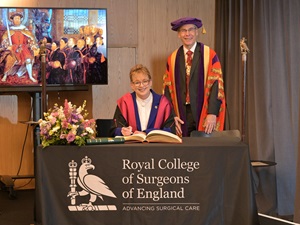2024 | Volume 25 | Issue 4


Dear colleagues
I returned from the UK last month where I was privileged to be awarded an Honorary Fellow of the Royal College of Surgeons of England by the president, Dr Tim Mitchell. While there, I had the opportunity to discuss with Dr Mitchell matters of mutual interests to our Colleges, thereby strengthening relationships and opportunities for collaboration.
Since I last wrote, my fellow Council members and I have been heavily focused on finalising our updated constitution. The new constitution allows us to establish a profession-led governance Board to lead the College under Council’s guidance into a strong and sustainable future.
You may recall that we paused voting on the constitution earlier this year to allow us additional time to consult with you and garner your feedback. I thank each of you who took the time to provide your input; the new version of the constitution that we are now putting to the vote is all the stronger for your contributions and addresses the key concerns raised by Fellows and specialty societies. Most importantly, it guarantees that our College continues to be profession-led while ensuring we meet the expectations of robust 21st century corporate governance and effective financial management.
I encourage you to read all the resources we have put together about the changes and watch this brief video in which our vice-president summarises the changes.
Although the vote is still pending, the new proposed constitution has met with wide acceptance in consultations to date and I am confident that you will do you part towards securing our future by voting YES.
In other news, we held a very productive and highly collegial workshop following the recent Council for Surgical Education and Training (CSET) meeting. The workshop focussed discussion on developing the Quality Improvement (QI) plan for the AMC/MCNZ critical accreditation work, with an aim of developing a roadmap to direct activities in the next six to12 months.
There were five topics discussed relating to proposed QI projects and aligned to accreditation requirements:
1. Selection
2. Perioperative care
3. Workforce planning
4. Rural training pathways
5. Education governance review
There were more than 60 attendees, included presidents, CEOs, chairs of Specialty Training Committees/Boards (STC/Bs), training managers and RACS Education staff. The workshop built on the past three months of intensive work and learning outcomes from the AMC resubmission.
We have had significant issues to tackle over the course of 2024, including the AMC accreditation submission and review of SIMG assessment regulations. We have been overwhelmed by the support from Specialty Society presidents, CEOs and Training Board/Committee Chairs. This indicates an enormous amount of goodwill on the part of the collective to work together to build a secure future for surgical education and training.
Finally, as you are aware, a key remit of RACS is to support healthcare in the community, and we have a strong history of doing so via targeted advocacy. Recently, Dr Matthew Hope, chair of the RACS Trauma Committee, spoke extensively to the media against a petition calling for speed limits in Queensland to be increased to 130km/h. Calling the petition irresponsible, reckless and potentially catastrophic, Dr Hope stressed the evidence showing that the faster you go, the longer it takes to stop and if you crash, the more severe the impact.
For more than 50 years, the RACS Trauma Committee has worked with policy makers and legislators to strengthen road safety measures, including mandatory seat belt wearing, drink driving countermeasures and helmet laws. I have no doubt that collectively these efforts have contributed to saving thousands of lives, thereby cementing the importance of the surgical voice in Australian public policy.
I hope you manage to keep warm as we head towards the end of the winter months.
Associate Professor Kerin Fielding
President